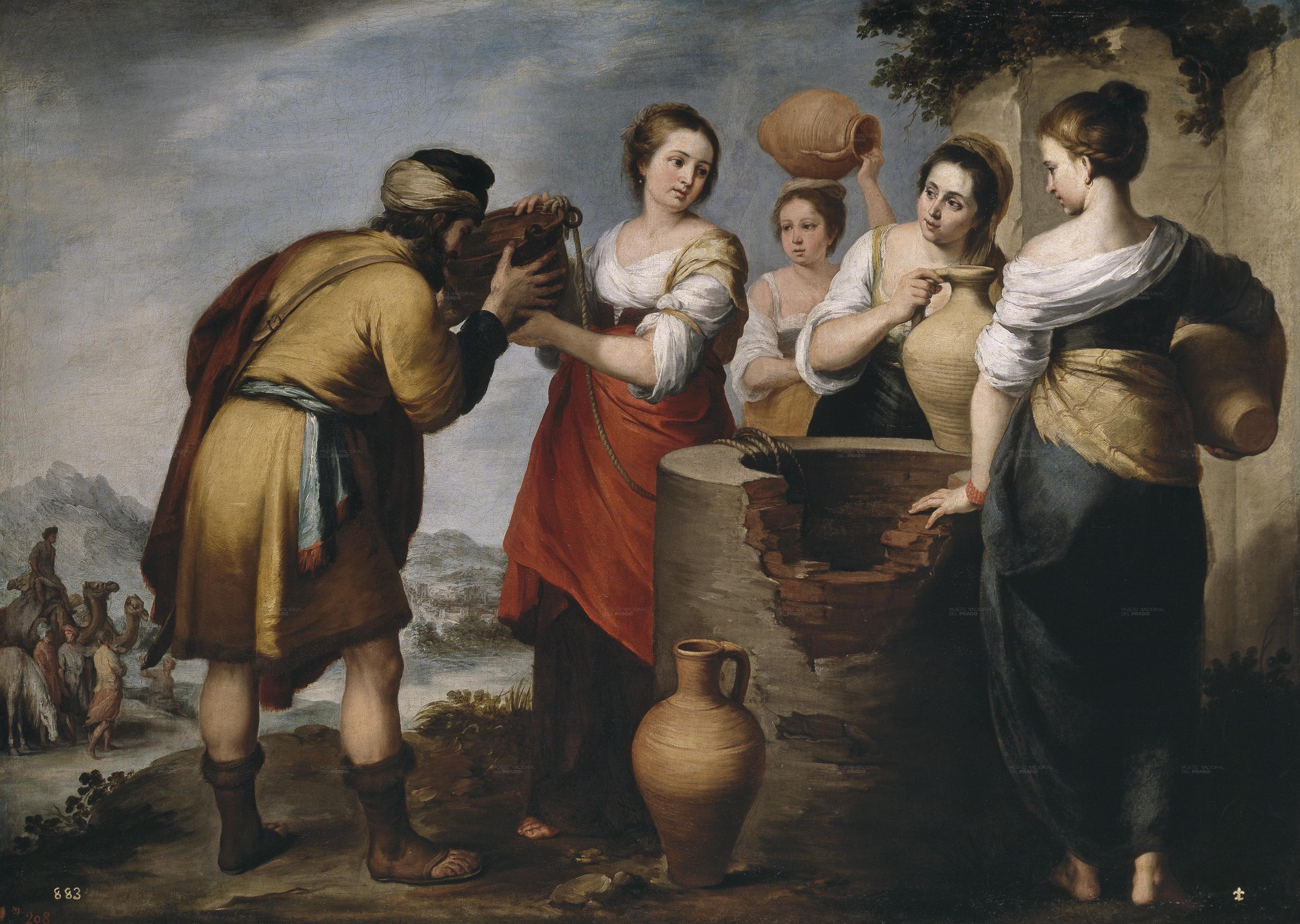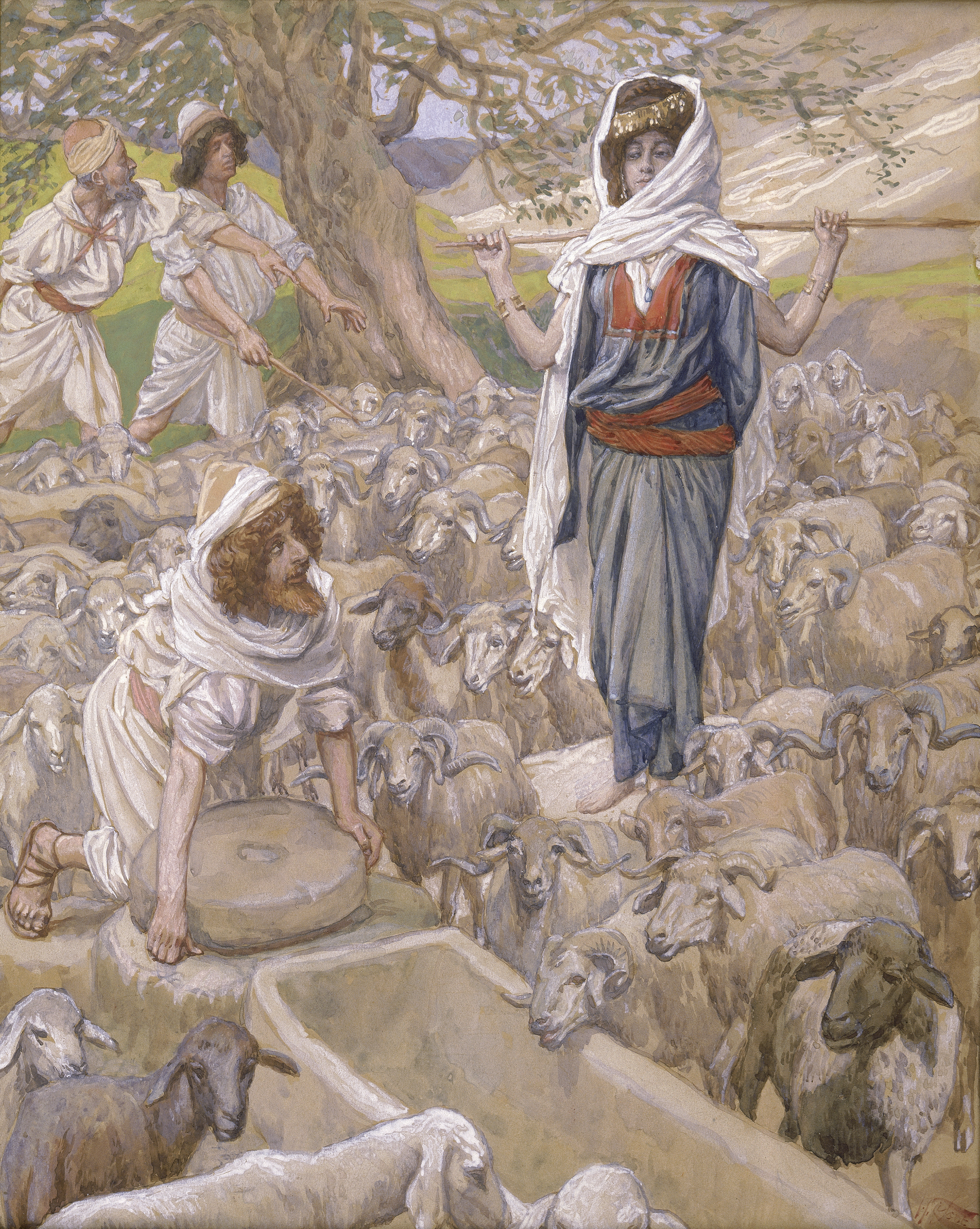|
Badeken
''Badeken'', ''Bedeken'', ''Badekenish'', or ''Bedekung'' ( yi, באַדעקן ''badekn'', lit. covering), is the ceremony where the groom veils the bride in a Jewish wedding. Just prior to the actual wedding ceremony, which takes place under the ''chuppah'', the bridegroom, accompanied by his parents, the Rabbi, and other dignitaries, and amidst joyous singing of his friends, covers the bride's face with a veil. At this point, it is traditional for the Rabbi to pronounce a blessing upon the couple. The bride wears this veil until the conclusion of the chuppah ceremony. Sources The custom of a virgin bride wearing a veil is mentioned in the Talmud. The veiling itself is a symbol of modesty, based upon the verse in connection with Rebecca meeting Isaac, " en she took her veil and covered herself." The practice of the groom uncovering the veil comes from when Jacob married Leah by accident because her face was veiled, when he really wanted to marry Rachel Rachel () was a B ... [...More Info...] [...Related Items...] OR: [Wikipedia] [Google] [Baidu] |
Jewish Wedding
A Jewish wedding is a wedding ceremony that follows Jewish laws and traditions. While wedding ceremonies vary, common features of a Jewish wedding include a ''ketubah'' (marriage contract) which is signed by two witnesses, a ''chuppah'' or ''huppah'' (wedding canopy), a ring owned by the groom that is given to the bride under the canopy, and the breaking of a glass. Technically, the Jewish wedding process has two distinct stages. The first, '' kiddushin'' (Hebrew for "betrothal"; sanctification or dedication, also called ''erusin'') and ''nissuin'' (marriage), is when the couple start their life together. It is at the first stage (kiddushin) when the women becomes prohibited to all other men, requiring a ''get'' (religious divorce) to dissolve it, while the second stage permits the couple to each other. The ceremony that accomplishes ''nissuin'' is also known as ''chuppah''.Made in Heaven, A Jewish Wedding Guide by Rabbi Aryeh Kaplan, Moznaim Publishing Company, New York / Jerus ... [...More Info...] [...Related Items...] OR: [Wikipedia] [Google] [Baidu] |
Chuppah
A ''chuppah'' ( he, חוּפָּה, pl. חוּפּוֹת, ''chuppot'', literally, "canopy" or "covering"), also huppah, chipe, chupah, or chuppa, is a canopy under which a Judaism, Jewish couple stand during their Jewish wedding, wedding ceremony. It consists of a cloth or sheet, sometimes a tallit, stretched or supported over four poles, or sometimes manually held up by attendants to the ceremony. A ''chuppah'' symbolizes the home that the couple will build together. In a more general sense, ''chuppah'' refers to the method by which ''nesuin'', the second stage of a Jewish marriage, is accomplished. According to some opinions, it is accomplished by the couple standing under the canopy along with the rabbi who weds them; however, there are other views., Chapter 18 Customs A traditional ''chuppah'', especially in Orthodox Judaism, recommends that there be open sky exactly above the ''chuppah'', although this is not mandatory among Sephardic communities. If the wedding ceremony ... [...More Info...] [...Related Items...] OR: [Wikipedia] [Google] [Baidu] |
Rebecca
Rebecca, ; Syriac: , ) from the Hebrew (lit., 'connection'), from Semitic root , 'to tie, couple or join', 'to secure', or 'to snare') () appears in the Hebrew Bible as the wife of Isaac and the mother of Jacob and Esau. According to biblical tradition, Rebecca's father was Bethuel the Aramean from Paddan Aram, also called Aram-Naharaim. Rebecca's brother was Laban the Aramean, and she was the granddaughter of Milcah and Nahor, the brother of Abraham. Rebecca and Isaac were one of the four couples that some believe are buried in the Cave of the Patriarchs, the other three being Adam and Eve, Abraham and Sarah, and Jacob and Leah. Early life After the Binding of Isaac, Sarah died. After taking care of her burial, Abraham went about finding a wife for his son Isaac, who was already 37 years old. He commanded his servant (whom the Torah commentators identify as Eliezer of Damascus) to journey to his birthplace of Aram Naharaim to select a bride from his own family, rather than ... [...More Info...] [...Related Items...] OR: [Wikipedia] [Google] [Baidu] |
Rabbi
A rabbi () is a spiritual leader or religious teacher in Judaism. One becomes a rabbi by being ordained by another rabbi – known as '' semikha'' – following a course of study of Jewish history and texts such as the Talmud. The basic form of the rabbi developed in the Pharisaic (167 BCE–73 CE) and Talmudic (70–640 CE) eras, when learned teachers assembled to codify Judaism's written and oral laws. The title "rabbi" was first used in the first century CE. In more recent centuries, the duties of a rabbi became increasingly influenced by the duties of the Protestant Christian minister, hence the title " pulpit rabbis", and in 19th-century Germany and the United States rabbinic activities including sermons, pastoral counseling, and representing the community to the outside, all increased in importance. Within the various Jewish denominations, there are different requirements for rabbinic ordination, and differences in opinion regarding who is recognized as a rabbi. For ex ... [...More Info...] [...Related Items...] OR: [Wikipedia] [Google] [Baidu] |
Talmud
The Talmud (; he, , Talmūḏ) is the central text of Rabbinic Judaism and the primary source of Jewish religious law (''halakha'') and Jewish theology. Until the advent of modernity, in nearly all Jewish communities, the Talmud was the centerpiece of Jewish cultural life and was foundational to "all Jewish thought and aspirations", serving also as "the guide for the daily life" of Jews. The term ''Talmud'' normally refers to the collection of writings named specifically the Babylonian Talmud (), although there is also an earlier collection known as the Jerusalem Talmud (). It may also traditionally be called (), a Hebrew abbreviation of , or the "six orders" of the Mishnah. The Talmud has two components: the Mishnah (, 200 CE), a written compendium of the Oral Torah; and the Gemara (, 500 CE), an elucidation of the Mishnah and related Tannaitic writings that often ventures onto other subjects and expounds broadly on the Hebrew Bible. The term "Talmud" may refer to eith ... [...More Info...] [...Related Items...] OR: [Wikipedia] [Google] [Baidu] |
Isaac
Isaac; grc, Ἰσαάκ, Isaák; ar, إسحٰق/إسحاق, Isḥāq; am, ይስሐቅ is one of the three patriarchs of the Israelites and an important figure in the Abrahamic religions, including Judaism, Christianity, and Islam. He was the son of Abraham and Sarah, the father of Jacob and Esau, and the grandfather of the Twelve Tribes of Israel, twelve tribes of Israel. Isaac's name means "he will laugh", reflecting the laughter, in disbelief, of Abraham and Sarah, when told by God that they would have a child., He is the only patriarch whose name was not changed, and the only one who did not move out of Canaan. According to the narrative, he died aged 180, the longest-lived of the three patriarchs. Etymology The anglicized name "Isaac" is a transliteration of the Hebrew name () which literally means "He laughs/will laugh." Ugaritic language, Ugaritic texts dating from the 13th century BCE refer to the benevolent smile of the Canaanite religion, Canaanite deity El (deit ... [...More Info...] [...Related Items...] OR: [Wikipedia] [Google] [Baidu] |
Jacob
Jacob (; ; ar, يَعْقُوب, Yaʿqūb; gr, Ἰακώβ, Iakṓb), later given the name Israel, is regarded as a patriarch of the Israelites and is an important figure in Abrahamic religions, such as Judaism, Christianity, and Islam. Jacob first appears in the Book of Genesis, where he is described as the son of Isaac and Rebecca, and the grandson of Abraham, Sarah, and Bethuel. According to the biblical account, he was the second-born of Isaac's children, the elder being Jacob's fraternal twin brother, Esau. Jacob is said to have bought Esau's birthright and, with his mother's help, deceived his aging father to bless him instead of Esau. Later in the narrative, following a severe drought in his homeland of Canaan, Jacob and his descendants, with the help of his son Joseph (who had become a confidant of the pharaoh), moved to Egypt where Jacob died at the age of 147. He is supposed to have been buried in the Cave of Machpelah. Jacob had twelve sons through four ... [...More Info...] [...Related Items...] OR: [Wikipedia] [Google] [Baidu] |
Leah
Leah ''La'ya;'' from (; ) appears in the Hebrew Bible as one of the two wives of the Biblical patriarch Jacob. Leah was Jacob's first wife, and the older sister of his second (and favored) wife Rachel. She is the mother of Jacob's first son Reuben. She has three more sons, namely Simeon, Levi and Judah, but does not bear another son until Rachel offers her a night with Jacob in exchange for some mandrake root (, ''dûdâ'îm''). Leah gives birth to two more sons after this, Issachar and Zebulun, and to Jacob's only daughter, Dinah. Biblical narrative Overview Leah first appears in the Book of Genesis, in Genesis 29, which describes her as the daughter of Laban and the older sister of Rachel, and is said to not compare to Rachel's physical beauty and that she has tender eyes.) (Genesis 29:17). It is debated as to whether the adjective "tender" () should be taken to mean "delicate and soft" or "weary". Some translations say that it may have meant blue or light colored eyes. ... [...More Info...] [...Related Items...] OR: [Wikipedia] [Google] [Baidu] |
Rachel
Rachel () was a Biblical figure, the favorite of Jacob's two wives, and the mother of Joseph and Benjamin, two of the twelve progenitors of the tribes of Israel. Rachel's father was Laban. Her older sister was Leah, Jacob's first wife. Her aunt Rebecca was Jacob's mother. After Leah conceived again, Rachel was finally blessed with a son, Joseph, who would become Jacob's favorite child. Children Rachel's son Joseph was destined to be the leader of Israel's tribes between exile and nationhood. This role is exemplified in the Biblical story of Joseph, who prepared the way in Egypt for his family's exile there. After Joseph's birth, Jacob decided to return to the land of Canaan with his family. Fearing that Laban would deter him, he fled with his two wives, Leah and Rachel, and twelve children without informing his father-in-law. Laban pursued him and accused him of stealing his idols. Indeed, Rachel had taken her father's idols, hidden them inside her camel's seat cushion, an ... [...More Info...] [...Related Items...] OR: [Wikipedia] [Google] [Baidu] |





